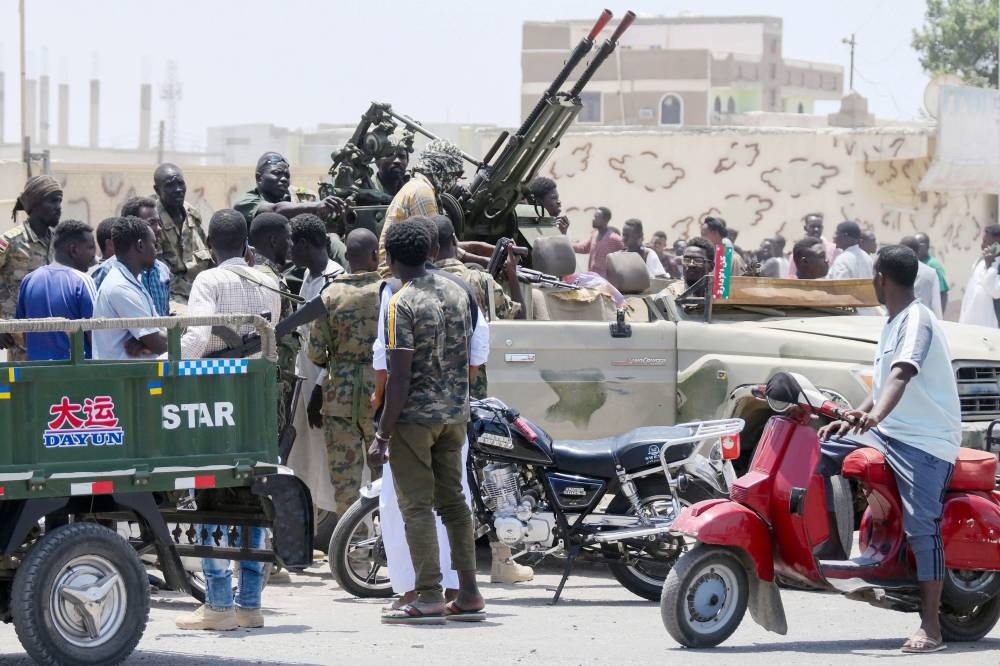Fierce fighting raged in Sudan's capital despite an hours-long pause Sunday to address humanitarian needs including the evacuation of wounded, on the second day of battles that left three UN staff among more than 50 civilians killed throughout the country.
The World Food Programme said it was suspending operations in the impoverished country after the killing of its three workers.
The battles between the powerful armed forces and the Rapid Support Forces (RSF) sparked an international outcry and regional concern, including border closures by neighbours Egypt and Chad.
Deafening explosions and intense gunfire rattled buildings in the capital Khartoum's densely-populated northern and southern suburbs as tanks rumbled on the streets and fighter jets roared overhead, witnesses said.
Fighting continued after nightfall on Sunday, as Sudanese hunkered down in their homes with fears of a prolonged conflict that could plunge the country into deeper chaos, dashing long-held hopes for a transition to civilian-led democracy.
Violence erupted early Saturday following weeks of power struggles between army chief Abdel Fattah al-Burhan and his deputy, Mohamed Hamdan Daglo who heads the heavily-armed RSF.
The pro-democracy Central Committee of Sudan Doctors reported 56 civilians killed as well as "tens of deaths" among security forces, and around 600 wounded.
Despite the pause, heavy gunfire could still be heard in central Khartoum near the airport, and dense black smoke billowed from the surrounding area.
Daglo's RSF say they have seized the presidential palace, Khartoum airport and other strategic locations, but the army insist they are still in control.
As the fighting continued, the stench of gunpowder wafted through Khartoum's streets, deserted except for soldiers.
Medics pleaded for safe corridors for ambulances and a ceasefire to treat the victims because the streets were too dangerous for transporting casualties to hospital.
Fighting also erupted in the western Darfur region and in the eastern border state of Kassala, where witness Hussein Saleh said the army fired artillery at a paramilitary camp.
The UN said its WFP employees had been killed Saturday in clashes in North Darfur and announced a "temporary halt to all operations in Sudan".
Created in 2013, the RSF emerged from the Janjaweed militia that then-president Omar al-Bashir unleashed against non-Arab ethnic minorities in Darfur a decade earlier, drawing accusations of war crimes.
The RSF's planned integration into the regular army was a key element of talks to finalise a deal that was hoped to restore Sudan's civilian transition and end the political-economic crisis sparked by the military's 2021 coup by Burhan and Daglo.
Appeals to end the fighting have come from across the region and the globe, including the US, Britain, China, the European Union and Russia.
After a meeting on the situation in Sudan, the African Union said a senior official would "immediately" travel there on a ceasefire mission.
The Arab League bloc held an emergency meeting in Cairo, at the request of Egypt and Saudi Arabia.
Sudan's former prime minister Abdalla Hamdok, at a press conference in Abu Dhabi, described the humanitarian situation as "catastrophic", called for a truce, and appealed for "a helping hand" particularly from Arab countries.
But the two generals appeared in no mood for talks, having described each other as criminals.

Sudanese greet army soldiers, loyal to army chief Abdel Fattah al-Burhan, in the Red Sea city of Port Sudan on April 16. AFP

Sudanese greet army soldiers, loyal to army chief Abdel Fattah al-Burhan, in the Red Sea city of Port Sudan on April 16. AFP
